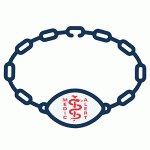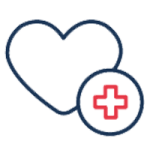People with rare disorders can be vulnerable in an emergency
If you’re living with a rare disease, it’s important to understand the possible complications that can happen because of your rare diagnosis. This especially includes how to prepare yourself for emergencies.
Emergencies can be scary for someone with a rare condition. Will first responders know anything about your specific symptoms or diagnosis? Are they familiar with your specialized drugs or treatment? Might you possibly receive a medication or intervention that is harmful to you due to lack of knowledge? How will emergency personnel know to contact your specialist or family?
Once you’re diagnosed with a rare disease, you’ll want to ensure you’re treated correctly in a medical emergency. Thankfully, with help from your team of healthcare providers and support from MedicAlert, you can be well prepared for any emergency.
What is a rare disease?
We’re all familiar with common chronic medical conditions like diabetes or high blood pressure. But what makes a disease rare? According to MedicAlert partner NORD (National Organization for Rare Disorders), a rare disease is one that affects fewer than 200,000 Americans. By comparison, type 2 diabetes alone affects more than 37 million adults in the U.S.
Some facts about rare diseases:
- There are more than 7,000 rare diseases identified (so far)
- Every year, researchers identify 250+ new rare conditions
- Today, 25-30 million Americans are living with a rare disease – that’s about 1 in 10 people
- As for causes, 72% of rare diseases are genetic
- Many cancers are rare – all pediatric cancers are considered rare, and there are 500+ rare cancers in all age groups
- More than 90% of rare diseases don’t have a treatment approved by the FDA
You’ve probably heard of some of the conditions that qualify as a rare disease. These include diagnoses like multiple sclerosis (MS) or ALS (Lou Gehrig’s disease). But there are many, many more you will never hear of, and don’t even know exist. NORD has a database with details on many rare disorders.
How MedicAlert helps people with rare diseases in an emergency
Imagine that you’re in an accident or medical emergency. You are unconscious or aren’t able to communicate about your rare disorder or specialized treatment protocols. That could be a huge risk to your health and safety. Who will speak for you if you can’t speak for yourself?
That’s where MedicAlert comes in. Having the safety of a MedicAlert ID and Protection Plan is critical. MedicAlert will be your voice in an emergency. We’re with you 24/7 to communicate your health details and help coordinate your care. That way, your care isn’t delayed or incorrect due to a misunderstanding or lack of knowledge.
MedicAlert’s globally recognized symbol for medical emergencies on our wearable IDs immediately signals your condition to emergency personnel. First responders are trained to look for MedicAlert IDs. They know that all details important to your condition are readily available from MedicAlert’s emergency specialists. And that the information from MedicAlert helps them provide you with faster, more accurate care.
Along with wearing a MedicAlert ID, a Protection Plan gives you an added layer of safety that’s critical for anyone living with a rare disease. The benefits of an Advantage Plus plan include:
- Robust, secure digital health profile to store your medical conditions, medications, allergies, past surgeries, implanted medical devices, vaccinations, provider contacts, and more
- Team of 24/7 emergency response specialists who relay your vital information to first responders in an emergency
- Emergency contact notification so your loved ones can be by your side quickly in a crisis
- Patient instructions that share information important to your care
- Document storage for medical device info or specific treatment plans related to your rare disorder
- Secure storage and transmittal of your advance directives, such as DNR status
- A printable patient profile that you can use for medical appointments and to keep track of your medications
In an emergency when every second counts, MedicAlert is there to help you get the care you need. MedicAlert Foundation has a proven track record of success in improving emergency outcomes. In fact, we’ve helped save more than 4 million lives since our founding 67 years ago.
Getting diagnosed & educating yourself
Even though rare diseases are a small proportion of overall health conditions, rare disorders impact 1 in 10 Americans. Half are children. Knowing how to manage a rare disease is a big part of life for these individuals and their families.
The first step to getting the right treatment is receiving a diagnosis. For many, this is the most difficult part of their rare disease journey. Often this includes finding a rare disease specialist who is familiar with your possible diagnosis. Once you’re diagnosed, your specialist will recommend a treatment plan, and identify other healthcare providers that should be a part of your care team.
No matter what your treatment is, the key to living a full and active life is to educate yourself about your condition. Ask your medical team lots of questions. It’s critical that you understand your plan of care and know when to seek help. Being a self-advocate in your medical care will help you better manage your rare condition. It will also give you a greater sense of control.

“One thing we’ve learned from our partner NORD is that rare is not rare when people stand together.”
Challenges of living with a rare disease
These are some challenges you may face if you are living with a rare disease:
- Getting the right diagnosis. More than 40% of people with a rare disease are misdiagnosed more than once before they receive their correct diagnosis. The average time to correct diagnosis for a rare disease is 3-5 years. Many remain undiagnosed or misdiagnosed long enough that it can affect their eventual disease outcomes.
- Locating a specialist who treats your condition. Many family doctors aren’t familiar with rare diseases, and specialists may not be close to where you live. You may have to travel to access specialized care – meaning added time, cost, and stress.
- Treatment can be scarce and expensive. The medications used to treat rare diseases are often called “orphan drugs” because they’re not used for common conditions. There’s little incentive for pharmaceutical companies to develop drugs for rare diseases. That’s why Congress passed the Orphan Drug Act in 1983. The law spurred development of hundreds of new rare disease drugs, but the costs for these drugs can be astronomical. The average yearly cost of rare disease treatments is $32,000 and can even reach $100,000. Some patients face annual costs of $500,000 or more. And despite more drug development, 90% of rare diseases still do not have an FDA-approved treatment.
- Access to services and assistance can be difficult. Social, financial, and medical programs – including health insurance coverage – can sometimes limit services for rare diseases because the decision-makers involved do not understand your condition.
- Awareness and understanding are limited. Since some rare diseases have a patient population of fewer than 100, it’s often hard to find others who relate to what you’re going through. Employers, friends, and even family may not understand your specific disease and its symptoms. This lack of knowledge can extend to healthcare personnel as well – both routine and emergency providers. You constantly have to educate others about your condition.
While there are a lot of day-to-day challenges associated with rare diseases, you can be proactive in many areas. One thing we’ve learned from our partner NORD is that rare is not rare when people stand together. When the 20-30 million Americans living with rare disorders unite to raise awareness, educate, and advocate for more and better treatment options, rare can be strong.
Resources for those living with rare disease
MedicAlert is proud to partner with NORD to help raise awareness of rare diseases, and how person with a rare disorder can stay safe in an emergency.
NORD has many invaluable resources to help those living with rare diseases:
- Patient Assistance Programs
- Rare Disease Database
- Rare Disease Resource Library
- Rare Disease Centers of Excellence
- Clinical Trials and Research Studies
- Patient Support Groups
These resources can help you better understand your condition, stay involved in your care, and find financial or other aid. Adding an expert medical team and support from MedicAlert will further enhance your quality of life.
You’re not alone
You don’t have to face a rare disease alone. Organizations like NORD and the National Institutes of Health will help you find the information you need to better manage your condition. And MedicAlert Foundation protects tens of thousands of people with rare disorders – from adrenal insufficiency to Zollinger-Ellison Syndrome, and everything in between. Being prepared for an accident or medical emergency empowers you to focus on enjoying life, instead of worrying about the unexpected. Take a positive step towards your safety and peace of mind with MedicAlert.




